
Judge clears way for North Carolina 12-week abortion ban to take effect, blocks one provision of law
A federal judge will allow a ban on most abortions in North Carolina after 12 weeks of pregnancy to go into effect on Saturday but temporarily blocked one provision included in the law.
2023-07-01 05:30
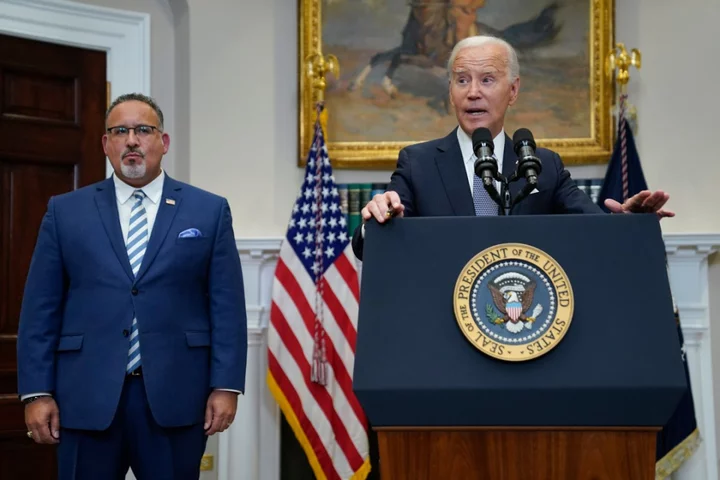
Biden reveals ‘new path’ to student debt relief after Supreme Court strikes down president’s plan
After the US Supreme Court struck down his administration’s plan to cancel federal student loan debts for millions of Americans, President Joe Biden has unveiled a “new path” for relief, one that he assured is “legally sound” but will “take longer”. In remarks from the White House on 30 June, the president hit out at Republican state officials and legislators who supported the lawsuit which enabled the nation’s highest court to strike down his student debt forgiveness initiative, accusing many of them of hypocrisy for taking money from pandemic-era relief programs while opposing relatively meager relief for student loan borrowers. “Some of the same elected Republicans, members of Congress who strongly opposed relief for students, got hundreds of thousands of dollars themselves ... several members of Congress got over a million dollars — all those loans are forgiven,” he said. “The hypocrisy is stunning,” he said. Accompanied by Secretary of Education Miguel Cardona, Mr Biden opened his remarks by acknowledging that there are likely “millions of Americans” who now “feel disappointed and discouraged or even a little bit angry about the court’s decision today on student debt”. “And I must admit, I do too,” he said. Still, Mr Biden reminded Americans that his administration has previously taken actions to reform student loan repayment programs to make them easier to access, and to keep borrowers from spending more than five per cent of disposable income on monthly repayments, and to strengthen loan forgiveness options for borrowers who take public service jobs. The president has directed Mr Cardona to “find a new way” to grant similar loan relief “as fast as we can” in a way that is “consistent” with the high court’s decision. On Friday, the Education Department issued the first step in the process of issuing new regulations under this so-called “negotiated rulemaking” process. In the mean time, Mr Biden said his administration is creating a temporary year-long “on-ramp repayment programme” under which conditions will remain largely the same as they have during the three-year pandemic-era pause in payments which is set to expire this fall. The department’s 12-month “on ramp” to begin repayments, from 1 October through 30 September, aims to prevent borrowers who miss repayments in that time period from delinquency, credit issues, default and referral to debt collection agencies. “During this period if you can pay your monthly bills you should, but if you cannot, if you miss payments, this on-ramp temporarily removes the threat of default,” he said. “Today’s decision closed one path. Now we’re going to pursue another — I’m never gonna stop fighting,” the president continued, adding that he will use “every tool” at his disposal to get Americans the student debt relief they need so they can “reach [their] dreams”. “It’s good for the economy. It’s good for the country. It’s gonna be good for you,” he said. Asked by reporters whether he’d given borrowers false hope by initiating the now-doomed forgiveness plan last year, Mr Biden angrily chided the GOP for having acted to take away the path to debt relief for millions. “I didn’t give any false hope. The question was whether or not I would do even more than was requested. What I did I felt was appropriate and was able to be done and would get done. I didn’t give borrowers false hope. But the Republicans snatched away the hope that they were given and it’s real, real hope,” he said. The Supreme Court’s 6-3 ruling from the conservative majority argues that the president does not have the authority to implement sweeping relief, and that Congress never authorised the administration to do so. Under the plan unveiled by the Biden administration last year, millions of people who took out federally backed student loans would be eligible for up to $20,000 in relief. Borrowers earning up to $125,000, or $250,000 for married couples, would be eligible for up to $10,000 of their federal student loans to be wiped out. Those borrowers would be eligible to receive up to $20,000 in relief if they received Pell grants. Roughly 43 million federal student loan borrowers would be eligible for that relief, including 20 million people who stand to have their debts cancelled completely, according to the White House. Lawyers for the Biden administration contended that he has the authority to broadly cancel student loan debt under the Higher Education Relief Opportunities for Students Act of 2003, which allows the secretary of education to waive or modify loan provisions following a national emergency – in this case, Covid-19. Since March 2020, with congressional passage of the Cares Act, monthly payments on student loan debt have been frozen with interest rates set at zero per cent. That pandemic-era moratorium, first enacted under Donald Trump and extended several times, was paused a final time late last year. Over the last decade, the student loan debt crisis has exploded to a balance of nearly $2 trillion, most of which is wrapped up in federal loans. The amount of debt taken out to support student loans for higher education costs has surged alongside growing tuition costs, increased private university enrollment, stagnant wages and GOP-led governments stripping investments in higher education and aid, putting the burden of college costs largely on students and their families. Read More Supreme Court strikes down Biden’s plan to cancel student loan debts Supreme Court strikes down affirmative action, banning colleges from factoring race in admissions Biden condemns Supreme Court striking down affirmative action: ‘This is not a normal court’ Justice Ketanji Brown Jackson delivers searing civil rights lesson in dissent to affirmative action ruling
2023-07-01 04:48
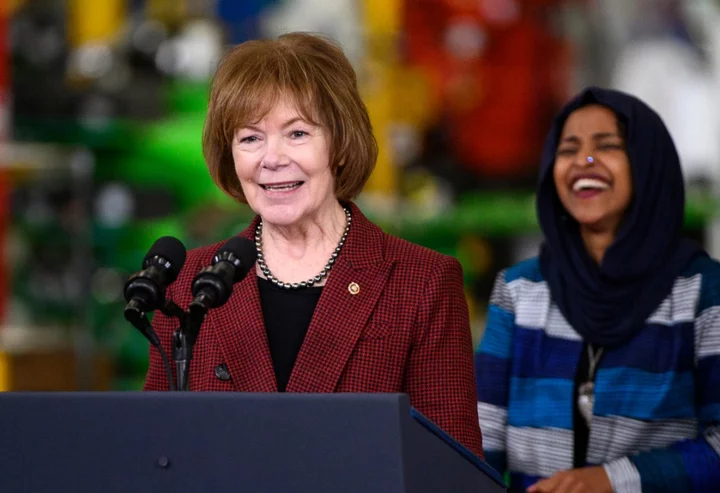
Senator who once worked at a Planned Parenthood warns that Republicans are planning a national abortion ban
When a draft of the Supreme Court’s Dobbs v Jackson opinion that would overturn Roe v Wade leaked in May of last year, US Senator Tina Smith had only three words. “This is bulls***,” the Minnesota Democrat tweeted. She had similar words when Walgreens announced in March of this year it would not dispense abortion pills in states where abortion remained legal. Ms Smith told The Independent in a phone interview that she knew the consequences of overturning the enshrined constitutional right to seek an abortion from her time working at Planned Parenthood as the Minnesota branch’s executive vice president for external affairs. She said her time working there taught her about the effects restrictions have on women’s lives. “The first thing I realized is that for women facing a decision about what to do about an unplanned pregnancy, a pregnancy that they don't want, this is a purely personal decision for them,” she said. “As a policymaker, why do Republicans in the Senate and in state legislators around the country think that they know better than those women whose stories they'll never know? Why do they think that they should be the ones who decide? It’s those women's decisions.” Ms Smith said that the Dobbs decision has led to rooting the question of abortion rights in terms of personal freedom. “You know, they can see this, these stories of individuals and doctors that are trying to provide the best health care, get the best health care for people, and you know, they unable to do that and they can see that that's just wrong,” she said. Sen Smith arrived under peculiar circumstances after then-Governor Mark Dayton nominated her, while she was serving as lieutenant governor of Minnesota, to replace Sen Al Franken amid multiple allegations of inappropriate sexual behaviour. Similarly, she has often been overshadowed by Minnesota’s senior Democratic Sen Amy Klobuchar, who ran for president. She and fellow midwestern Democratic Sen Tammy Baldwin, of Wisconsin, have a running joke that reporters and Capitol Hill staff often confuse them. In the past year, Sen Smith has emerged as a stronger presence. She wrote some of the climate provisions in what would become the Inflation Reduction Act. When Sen John Fetterman (D-PA) left the Senate for a few weeks to undergo treatment for depression, she spoke about her own difficulties with the condition. In addition, she’s emerged as one of the strongest voices defending abortion rights. Ms Smith said the Dobbs decision has made the contrast between Democrats and Republicans clearer. In recent months, Sen Tommy Tuberville (R-AL) has blocked military nominations because of the Pentagon’s policy that reimburses people who travel out of state to receive abortions. “What Senator Tuberville is doing is so outside the norms of what we should be doing in the Senate, it's outrageous,” she said. “I just need to point out that what Senator Tuberville is trying to do is to overturn a policy which basically provides women serving in the military with the same access to health care that people that are incarcerated in our federal prisons have.” Few Republicans seem deterred from their opposition to abortion despite the role it played in dulling their efforts to flip the Senate last year. Ms Smith’s colleague Sen Tim Scott (R-SC), now a candidate for president, told the Faith & Freedom Coalition’s Road to Majority Conference last month “thank God almighty for the Dobbs decision.” Former vice president Mike Pence has called for a 15-week national abortion ban. Meanwhile, former president Donald Trump has campaigned as the president who nominated the three Supreme Court justices who made the decision possible. Florida Gov Ron DeSantis, who often places a second distant behind Mr Trump in polls, signed legislation banning abortion after six weeks. As vice chairwoman of the Democratic Senatorial Campaign Committee, Ms Smith faces a tough challenge because not only does she have to defend Senate seats in Wisconsin, Michigan, Pennsylvania, Arizona and Nevada – all of which President Joe Biden won in 2020 – she also has to defend Senate seats in three states Mr Trump won twice: Ohio, Montana and West Virginia. “And make no mistake, if Republicans win the Senate or if Republicans win the White House, we can see from their statements, they're going to move to pass a national ban on abortion,” she said, noting how many GOP candidates for Senate oppose abortion. “So, this is the contrast, this is what voters will be confronted with when they cast their votes in 2024,” she said. “Do you want to elect individuals who think they know better, that they should be the ones making decisions, individuals that want to ban abortion rights? Or do you want to elect Democrats who believe that women and not politicians should be making their own health care decisions?” At the same time, Democrats face huge challenges to codify abortion rights. Last week, Mr Biden told donors he was personally uncomfortable with abortion. “I'm a practising Catholic,” he said on Tuesday. “I'm not big on abortion, but guess what? Roe v Wade got it right.” Sen Smith defended Mr Biden’s actions defending abortion rights. “I believe that the President and the administration have moved decisively in all the ways that they can as they look for other ways to the practical reproductive freedom, that's a good thing,” she said. “I'm proud of the work that they've done. I think ultimately, the action that we need to take is legislative action, and that is why we need to win these elections.” Last year, shortly after the Dobbs leak, Senate Majority Leader Chuck Schumer tried to put the Women’s Health Protection Act, which would have codified the protections in Roe, to a vote. But Sen Joe Manchin (D-WV) opposed the measure. Even then, Sen Kyrsten Sinema of Arizona, who later left the Democratic Party to become an independent, opposes removing the filibuster, which demands a two-thirds majority to pass legislation. Sen Smith said if Democrats with the House, the Senate and the White House again, they should get rid of the filibuster. “And you know, we need to work towards a Senate majority that will not only support reproductive freedom but will also change Senate rules so that we can act on that belief,” she said. “And that I think is going to as I said before, that I believe will be a decisive issue in the in the elections in 2024.” Read More Congresswoman who authored abortion rights bill calls Senate’s inaction to codify Roe v Wade ‘such a crime’ Ritchie Torres, the only openly gay Black man in Congress, on how he fights GOP ‘bullying’ of LGBT+ people Republicans try to thread the needle on abortion on anniversary of the death of Roe 'Rage giving' prompted by the end of Roe has dropped off, abortion access groups say Arizona executive order safeguards abortion seekers and providers from prosecution Why some doctors stay in US states with restrictive abortion laws and others leave
2023-07-01 01:54

Biden's student loan forgiveness program was rejected by the Supreme Court. Here's what borrowers need to know
The Supreme Court struck down President Joe Biden's student loan forgiveness program Friday, blocking millions of borrowers from receiving up to $20,000 in federal student debt relief, just months before student loan payments are set to restart after a yearslong pause.
2023-07-01 00:17

Supreme Court strikes down Biden’s plan to cancel student loan debts
The US Supreme Court has struck down President Joe Biden’s plan to cancel student loan debts for millions of Americans, reversing his campaign-trail promise as borrowers prepare to resume payments this summer. Chief Justice John Roberts delivered the 6-3 decision from the court’s conservative majority. The ruling, which stems from a pair of cases challenging the Biden administration and the US Department of Education, argues that the president does not have authority to implement sweeping relief, and that Congress never authorised the administration to do so. Within 30 minutes on the last day of its term, the court upended protections for LGBT+ people and blocked the president from a long-held promise to cancel student loan balances amid a ballooning debt crisis impacting millions of Americans. Under the plan unveiled last year, millions of people who took out federally backed student loans would be eligible for up to $20,000 in relief. Borrowers earning up to $125,000, or $250,000 for married couples, would be eligible for up to $10,000 of their federal student loans to be wiped out. Those borrowers would be eligible to receive up to $20,000 in relief if they received Pell grants. Roughly 43 million federal student loan borrowers would be eligible for that relief, including 20 million people who stand to have their debts canceled completely, according to the White House. Roughly 16 million already submitted their applications and received approval for debt cancellation last year, according to the Biden administration. The long-anticipated plan for debt cancellation was met almost immediately with litigation threats from conservative legal groups and Republican officials, arguing that the executive branch does not have authority to broadly cancel such debt. Six GOP-led states sued the Biden administration to stop the plan altogether, and a federal appeals court temporarily blocked any such relief as the legal challenges played out. Since March 2020, with congressional passage of the Cares Act, monthly payments on student loan debt have been frozen with interest rates set at zero per cent. That Covid-19-pandemic era moratorium, first enacted under Donald Trump and extended several times, was paused a final time late last year – until the Education Department is allowed to cancel debts under the Biden plan, or until the litigation is resolved, but no later than 30 June. Payments would then resume 60 days later. The amount of debt taken out to support student loans for higher education costs has surged within the last decade, alongside growing tuition costs, increased private university enrollment, stagnant wages and GOP-led governments stripping investments in higher education and aid, putting the burden of college costs largely on students and their families. The crisis has exploded to a total balance of nearly $2 trillion, mostly wrapped up in federal loans. Millions of Americans also continue to tackle accrued interest without being able to chip away at their principal balances, even years after graduating, or have been forced to leave their colleges or universities without obtaining a degree at all while still facing loan repayments. Borrowers also have been trapped by predatory lending schemes with for-profit institutions and sky-high interest rates that have made it impossible for many borrowers to make any progress toward paying off their debt, with interest adding to balances that exceed the original loan. One analysis from the Education Department found that nearly 90 per cent of student loan relief would support people earning less than $75,000 per year. The median income of households with student loan balances is $76,400, while 7 per cent of borrowers are below the poverty line. That debt burden also falls disproportionately on Black borrowers and women. Black college graduates have an average of $52,000 in student loan debt and owe an average of $25,000 more than white graduates, according to the Education Data Initiative. Four years after graduating, Black student loan borrowers owe an average of 188 per cent more than white graduates. Women borrowers hold roughly two-thirds of all student loan debt, according to the American Association of University Women. Mr Biden’s announcement fulfilled a campaign-trail pledge to wipe out $10,000 in student loan debt per borrower if elected, though debt relief advocates and progressive lawmakers have urged him to cancel all debts and reject means-testing barriers in broad relief measures. In November 2020, the president called on Congress to “immediately” provide some relief for millions of borrowers saddled by growing debt. “[Student debt is] holding people up,” he said at the time. “They’re in real trouble. They’re having to make choices between paying their student loan and paying the rent.” This is a developing story Read More Supreme Court allows Colorado designer to deny LGBT+ customers in ruling on last day of Pride Month Biden condemns Supreme Court striking down affirmative action: ‘This is not a normal court’ Justice Ketanji Brown Jackson delivers searing civil rights lesson in dissent to affirmative action ruling
2023-06-30 23:16

What the Supreme Court's ruling on affirmative action does and does not do
The Supreme Court's landmark decision on Thursday to gut affirmative action has made it unlawful for colleges to take race into consideration as a specific factor in admissions.
2023-06-30 11:26
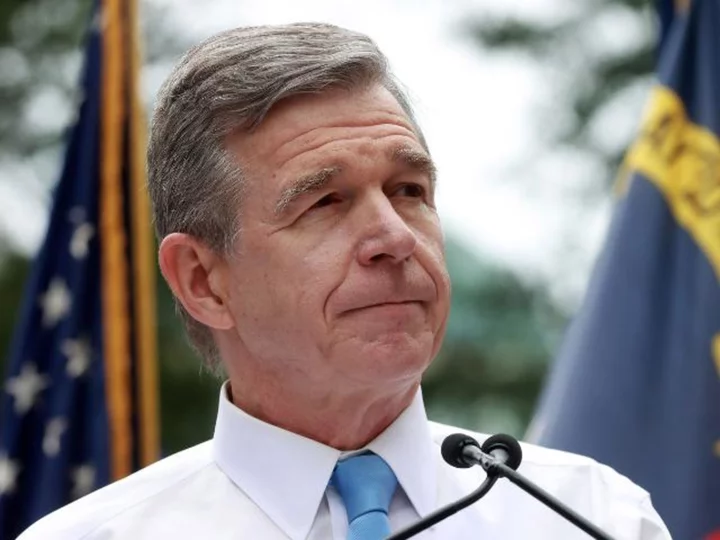
North Carolina governor signs bill adjusting new abortion law before it goes into effect
North Carolina Democratic Gov. Roy Cooper signed into law significant changes to the state's recently passed 12-week abortion ban before it is set to go into effect Saturday.
2023-06-30 10:21
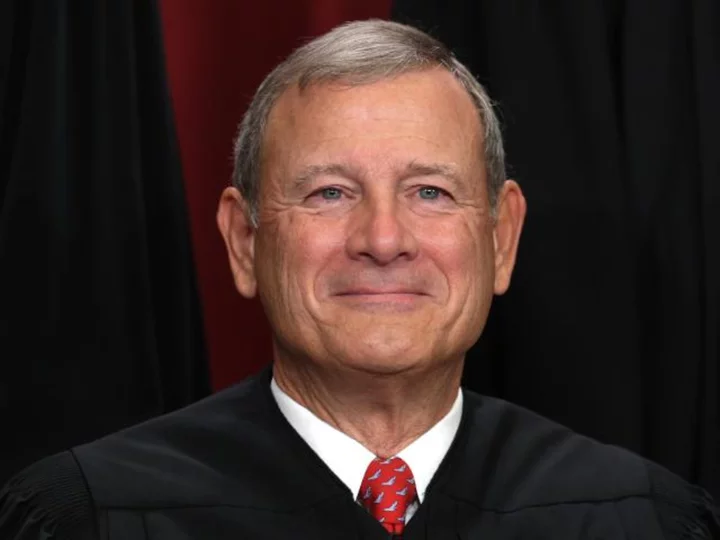
John Roberts doesn't want race to matter as he ends affirmative action for college admission programs
As he began reading excerpts of his decision eviscerating college affirmative action, in a hushed courtroom Thursday, Chief Justice John Roberts delivered on a singular long-held goal.
2023-06-30 07:57
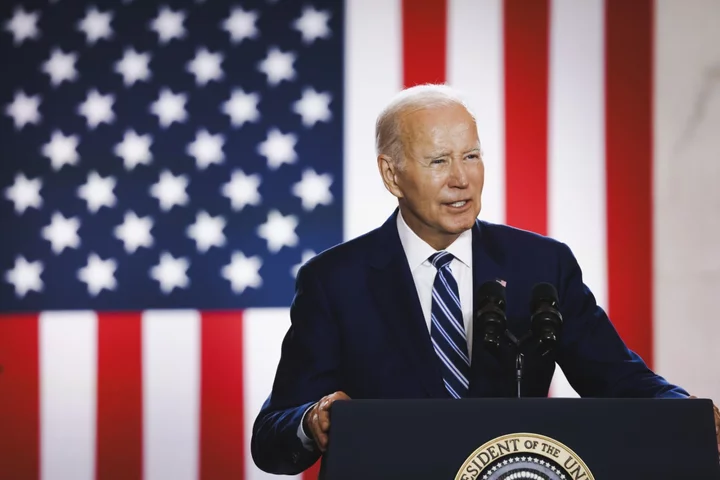
Biden Blocks Activist Bid to Slash Oil Output From Federal Lands
The Biden administration has formally rebuffed a bid by environmental activists to phase down oil and gas production
2023-06-30 03:23

How the White House prepared for the Supreme Court's affirmative action ruling
The White House has been preparing for months for a potential Supreme Court ruling gutting affirmative action, even as President Joe Biden expressed optimism late last year that the court would uphold consideration of race in college admissions.
2023-06-30 02:53

Biden condemns Supreme Court striking down affirmative action: ‘This is not a normal court’
President Joe Biden on Thursday said he “strongly, strongly disagree[d” with the Supreme Court’s decision to strike down the use of affirmative action programmes in college admissions decisions and condemned the six-justice majority that did so as “not a normal court”. Mr Biden’s harsh words for the highest court in the land came in response to a reporter’s query on whether the court was acting as a “rogue court,” just after he addressed the landmark decision in brief remarks before departing the White House for New York. Speaking from the Roosevelt Room in the West Wing, the president echoed the dissenting Justices, Sonia Sotomayor, Elena Kagan and Ketanji Brown Jackson, in his reaction to the ruling, which ends the long-standing precedent that allowed colleges and universities to use affirmative action to help establish a diverse group of accepted students. “Discrimination still exists in America. Today’s decision does not change that,” Mr Biden said in a brief press conference. He added: “I believe our colleges are stronger when they’re racially diverse. Our nation is stronger because we are tapping into the full range of talent in this nation. We cannot let this decision be the last word.” The rulings come from two consolidated cases, Students for Fair Admissions v University of North Carolina and Students for Fair Admissions v Harvard College. Both cases were brought forth by the anti-affirmative action organisation Students for Fair Admissions. That group, which is headed by conservative legal strategist Edward Blum, has for years made attempts to give the court’s GOP-appointed majority a chance to gut previous court precedents which have been used to justify limited use of race-based preferences in college admissions. While the court upheld such programmes in a decision nearly two decades, ago, the newly-emboldened conservative majority swept away any legal justification for them in Thursday’s opinions. In a 6-3 and 6-2 decision, the Court’s conservative majority sided with Students for Fair Admissions claiming the use of race-conscious admissions was a violation of the Equal Protection Clause of the 14th Amendment. Now, higher education institutions will no longer be allowed to consider race as a factor in admissions. Instead, students who wish to have their race or culture considered in their application will have to volunteer the information like in their personal essay. At the end of the press conference, Mr Biden responded to a question about the court’s decision to strike down a long-standing precedent: “This is not a normal Court.” Leaders from Harvard said in a letter that they would “comply” with the court’s decision but emphasised that “deep and transformative teaching, learning, and research depend upon a community comprising people of many backgrounds, perspectives, and lived experiences.” Mr Biden said he is directing the Department of Education to analyse best practices for high education institutions to create more inclusive and diverse student bodies without using race as a conscious factor in admissions and recruiting. The Harvard Black Students Association called the court’s decision, “detrimental”, adding that it “poses a significant threat to the future of the Black community on and beyond our campus.” “It is evident that the college application system cannot maintain holistic evaluation without taking into consideration how race profoundly influences our experiences, perspectives, and identities in multifaceted ways,” the Harvard Black Students Association wrote. Derrick Johnson, the president and CEO of the NAACP, said in a statement: “In a society still scarred by the wounds of racial disparities, the Supreme Court has displayed a willful ignorance of our reality.” Discussions around affirmative action have generated debate among Republicans and Democrats for years. Those in support of it believe it is necessary to create fair and equal opportunity for students of color because higher education institutions have failed at creating diverse student bodies. Those against affirmative action believe it puts other students, like white or Asian American students, at a disadvantage. Former president Donald Trump celebrated the ruling calling it “everyone was waiting for” in a post on Truth Social. “We’re going back to all merit-based – and that’s the way it should be!” Mr Trump wrote. Mr Trump appointed three of the six conservative Justices on the Court while serving as President of the United States – Justices Neil Gorsuch, Brett Kavanaugh and Amy Coney Barrett. Mr Trump’s former vice president, Mike Pence, also expressed support for the Court’s decision, writing on Twitter, “I am honored to have played a role in appointing three of the Justices that ensured today’s welcomed decision.” He added: “There is no place for discrimination based on race in the United States, and I am pleased that the Supreme Court has put an end to this egregious violation of civil and constitutional rights in admissions processes, which only served to perpetuate racism.” The ruling will likely have repercussions beyond higher education institutions, extending to elementary, middle and high schools as well as workplaces and more as it opens a door for challenges to racial diversity programs. Read More Justice Ketanji Brown Jackson delivers searing civil rights lesson in dissent to affirmative action ruling How the government that promised to ‘stop the boats’ has lost control of its immigration policy Clarence Thomas says he doesn’t have a ‘clue’ what diversity means as Supreme Court takes aim at affirmative action One year after the anti-abortion ruling, the White House keeps a spotlight on the issue
2023-06-30 02:16
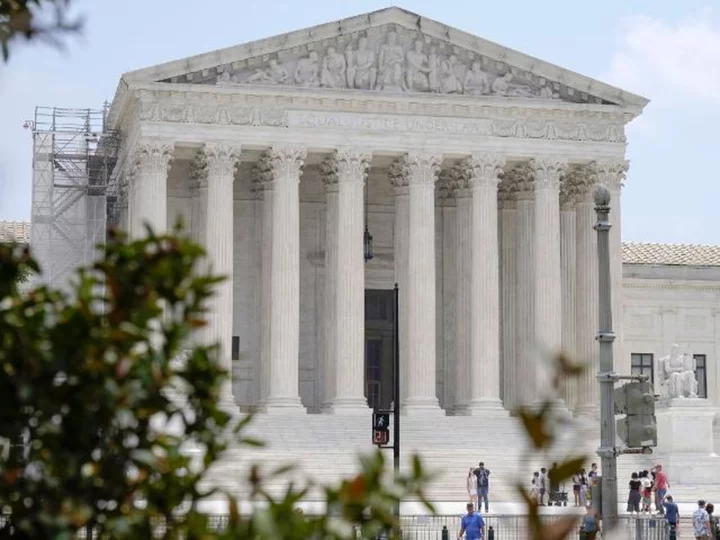
Supreme Court guts affirmative action in college admissions
The Supreme Court says colleges and universities can no longer take race into consideration as a specific basis for granting admission, a landmark decision that overturns long-standing precedent that has benefited Black and Latino students in higher education.
2023-06-29 22:23
